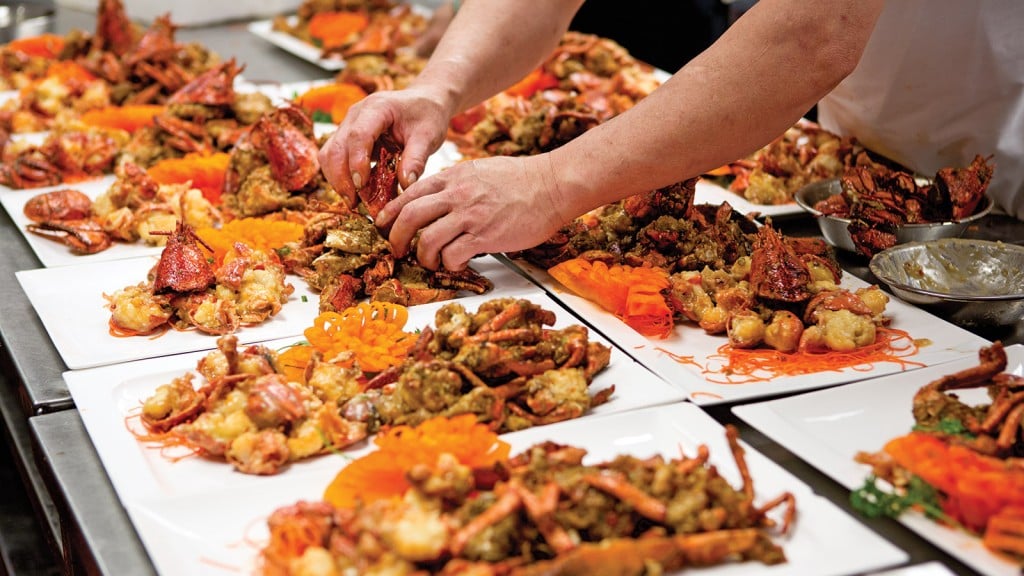Rescuing Chinese cuisine from the takeout container
Move aside, General Tao Chicken. The best classical Chinese-Canadian chefs remind us of the history imbued in the cuisine
Share

One splendid evening in late May, events transpiring in Toronto’s Times Square—a sprawling Chinese mall in Richmond Hill, Ont.—were tied directly to those scheduled for its namesake, down in New York City. For the mall’s Paramount banquet hall played host to a grand dinner, conceived to showcase the skills of select local Chinese chefs—and to nominate five of them to represent Canada at an international Chinese culinary showdown set to overrun that other Times Square on June 25 and 26.
The events are cogs in a master plan to put an end to Westerners’ entrenched association of the word “Chinese” with “takeout,” and replace it with the idea that the finest classical Chinese cooking represents 5,000 years of culture—on a plate. The initiative was hatched seven years ago by Taste Asia, a partnership between two New York-based international Chinese media giants (NTD TV and the Epoch Times) formed to promote Asian culture.
They want to highlight the range and breadth of Chinese cuisine by shining a spotlight on its constituent parts, or schools; the traditional “eight streams,” which, more recently, have been regrouped and simplified, by consensus, into five. Cantonese cuisine is often the simplest, least spicy and most delicate. Sichuan is the spiciest and, more often than not, boasts the greatest number of ingredients per dish. Huaiyang hails from Jiangsu province, on the east coast, and northeastern cuisine is rich and robust and most easily identified by the fact that its principal starch is not rice, but wheat. Shandong is considered something like the mother stream, a style that exerted the single greatest influence on the Imperial table at Beijing, and also far beyond—except that its prevalence in China is not reflected here, because the cuisine is rooted in the north, while most of our Chinese immigrants come from the south.
All the same, every stream is represented by innumerable restaurants here. And, with a view to separating wheat from chaff (or, as they may say in China, rice from hull), three master chefs from China and assorted other judges dined out across the Greater Toronto Area to pick the best chef working in each category. The Emperor’s Banquet at the Paramount was to be their showcase. There would be 10 courses: a feast. Some of it was highly intriguing, like the Huaiyang dish prepared by judge Jon Zhang: a mixture of lightly pickled, sweet, sour and crunchy vegetables (carrot, bitter melon, etc.). Huaiyang favours sweetness and prefers the slow braise to the scorching-hot wok. Its style was further illuminated by a dish of minced bean curd with wild herbs, and another of Shanghai marinated wheat cubes (prepared, respectively, by chefs from Sika Deer and New Shanghai, both in Scarborough).
Sichuan was ably represented by Richmond Hill’s Chuan Yu Home and their zesty beef—tender, thinly sliced shin in a wonderfully complex sauce. They also contributed Yuxiang scallops and tea-smoked duck—which was moist, tender and exquisitely smoky.
And then there was “supreme chicken for the empress,” a variation on Cantonese poached chicken—a conventional dish you can find at any Cantonese barbecue house. But this one, from Elegant Chinese Cuisine in Markham, was different. Supple, moist and sweet, it spoke of the shaoxing (rice wine) in the master stock in which it was poached. At least one of the judges from China proclaimed it to be the very best example of the dish he had ever sampled outside of China. Head judge Qu Yunquiang complimented the heat control in the cooking, the authenticity of flavour, the mild crispness to the skin—above all, the quality of the bird, which surprised him by being nearly as good as the chicken in China.
So the evening wrapped with this interesting result: Chuan Yu will be our Sichuan representative in New York. The chef from Markham’s Hunan Garden will—intriguingly—head stateside to represent his true passion, Shandong cuisine. And, as a reflection of our strength in Cantonese, both the Elegant and Richlane Chinese Cuisine will compete. And that’s it. According to the judges, Toronto’s best Huaiyang and northeastern chefs just aren’t worth sending anywhere.